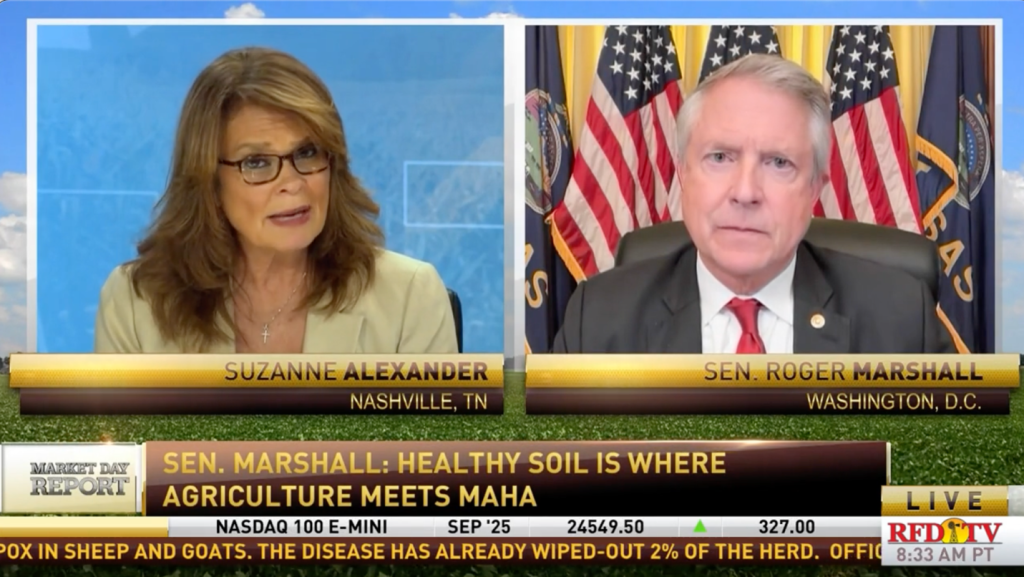Senator Marshall: Agriculture’s Voice is Being Heard
Senator Marshall Joins RFD-TV to Discuss the MAHA Strategy Report
Washington – On Thursday, U.S. Senator Roger Marshall, M.D. (R-Kansas), joined Suzanne Alexander on RFD-TV’s Market Day Report to discuss highlights from the MAHA strategy report, the role of soil health in the MAHA movement, and farm bill priorities.

Click HERE or on the image above to watch Senator Marshall’s full interview.
On standouts from the latest MAHA report:
“Well, Suzanne, great to be with you. And I think the emphasis is that agriculture’s voice is being heard. I know the White House entertained over 250 ag groups; we had a round table focused on soil health. We believe soil health is where agriculture meets MAHA, and as you notice in this report, they make no mention or concerns about fertilizer or chemicals. I think that we’ve educated them, and to help understand how important regenerative agriculture is, we’re trying to grow more with less, and they’re very open to that process as well. So good job, agriculture communicating to the White House, sharing our story.”
On role of pesticides in the MAHA movement:
“Well, I think that MAHA certainly has a better understanding than eight months ago, that if we don’t use some chemicals and some fertilizers, the price of groceries is going to go up 10x and then also, when we talk about organic farming versus what I call regenerative farming, is that we by using no till, minimal till we’re not disturbing the soil as much, we’re not releasing as much carbon in the air, and that that soil is going to be healthier and hold the water. And I think also, demonstrating that with proper tech, modern techniques, we can use 40-60% less fertilizers and chemicals, and we can decrease 90% of the drift. So, all the more so with the prices. I had a farmer in here yesterday, a corn farmer, that said he’s paying twice as much for next year’s fertilizer as he did for this year. So why not adopt agriculture practices where we’re going to use half as much fertilizer?”
On the importance of soil health:
“Yeah, let’s think about this childhood chronic illness epidemic we have. So, 20% of our adolescents are on a prescription drug. 30% of them are overweight. 40% of our adolescents have a chronic disease, and we do think a lot of that is nutritionally related. That’s why we’re fighting to get whole milk back into schools, to get more direct from farm to local school lunches. Help those local farmers where they’re having fresh produce or whatever. You know, it could be meat for as far as I’m concerned, but try to get local, local farmers directly to those local schools as well. I do think it starts with those basic things we were taught by our mothers, by our grandmothers, that we are what we eat, and it’s time we go back to the diet that I was raised on.”
On the farm bill and the government funding deadline:
“Well, I’m glad that we got most of the farm bill done. That we took care of crop insurance and reference prices in the One Big Beautiful Bill, and I certainly hope that this fall we can finish up the conservation part of the Farm Bill. Keeping the government open, not to throw any stones, but that’s up to Chuck Schumer. We need probably eight or nine Democrat votes to get a short-term a stopgap measure across the finish line. They’re taking a couple hostages. They are. They’re wanting another $40 billion for Obamacare subsidies, which we’re not excited about extending those as well. So, we have a deal in front of them, we think it’s a good deal just to continue the paying the limits that we did before, from last year until we get the rest of these bills across. So, I think we’ll get it done. But again, it’s up to Chuck Schumer if he wants to play games or if he wants to do what’s best for the American public.”
On his message to farmers ahead of harvest season:
“Well, certainly I understand the struggles in agriculture right now, with high input costs and just some of the worst commodity prices in our lifetime. I think the focus though it’s going to be more than trade. We’re going to actually export over what we usually export 2 million bushels of corn a year. We’re going to export 2.8 million bushels of corn of soy, soybean and wheat are both up about 5-10%. What we must focus on right now here is we need a year-round E15. That would give us some immediate relief and just encourage everybody out there to work with their Congressman, their Senators, the White House, saying we need year-round E15. That’s the best thing we can do to support farmers today. And sure, it would be great to get China to open their markets and buy some sorghum as well. That’s my message to the White House this week. If China could buy about $2 billion of sorghum, it would make a huge help as we have just what looks like a record crop out there for sorghum this fall.”
###
Contact: Payton Fuller
